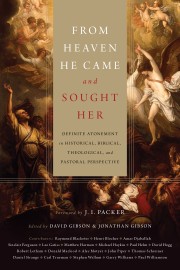Author Interview Part 2
Today we continue our interview with David and Jonathan Gibson, editors of From Heaven He Came and Sought Her: Definite Atonement in Historical, Biblical, Theological, and Pastoral Perspective (Crossway). If you need to catch up, you can see part one of this interview here.
Books At a Glance (Fred Zaspel):
Please highlight for us the devotional value of this doctrine to the individual Christian. What is the personal advantage of understanding and embracing the doctrine of particular redemption? And how is the opposing view “less comfortable”?
Gibson Brothers:
Three advantages come to mind. First, it enhances the personal aspect of God’s love for us as believers. Luther said that the sweetness of the gospel is found in the personal pronouns: “the Son of God who loved me and gave himself for me” (Gal. 2:20).
 Second, it provides us with assurance. Following the logic of Romans 8:32, Paul assures us that if God has done the harder thing—not sparing his Son but giving him up for us all—how will he not also do the lesser thing—give us all the things required to bring us to glory. In other words, if the triune God—Father, Son, and Holy Spirit—has worked to bring about our salvation, who then shall be against us? Understanding the cross as the propitiation of God’s wrath for all of my sins helps me to see that I cannot experience God’s wrath on the last great day of judgment. The price has been paid, the penalty borne, the law satisfied, and condemnation removed. Calvin commented on Romans 8:32 that the death of Jesus “anticipates” the judgment of God—it is that end-time judgment brought forward in time and spent on Christ instead of his people. God will not and cannot punish the same sins twice. The punishment inflicted on the Son by the Father for my sins has removed any punishment for me.
Second, it provides us with assurance. Following the logic of Romans 8:32, Paul assures us that if God has done the harder thing—not sparing his Son but giving him up for us all—how will he not also do the lesser thing—give us all the things required to bring us to glory. In other words, if the triune God—Father, Son, and Holy Spirit—has worked to bring about our salvation, who then shall be against us? Understanding the cross as the propitiation of God’s wrath for all of my sins helps me to see that I cannot experience God’s wrath on the last great day of judgment. The price has been paid, the penalty borne, the law satisfied, and condemnation removed. Calvin commented on Romans 8:32 that the death of Jesus “anticipates” the judgment of God—it is that end-time judgment brought forward in time and spent on Christ instead of his people. God will not and cannot punish the same sins twice. The punishment inflicted on the Son by the Father for my sins has removed any punishment for me.
Third, it serves as a motivation for evangelism and mission. The gospel we proclaim is one in which Christ has propitiated the Father’s wrath for sinners—not potentially or possibly or hypothetically—but actually. Moreover, since he has definitely died for all kinds of people, missionaries can take the gospel to the unreached people groups of this world with confidence, knowing that there are some within each of those groups for whom Christ died. Note Revelation 5:9: “by your blood you ransomed people for God from every tribe and language and people and nation, and you have made them a kingdom and priests to our God, and they shall reign on the earth.” What a great motivation for missionaries!
One of the main drawbacks with a universal atonement is that it gives the impression that God’s love for his church is an “afterthought,” as if the primary goal of the cross was to provide a salvation for a lost world, but one which would never materialize. Moreover, if Christ’s atoning death doesn’t save everyone, how can you be sure that it will finally save you?
Books At a Glance:
Do you have a few tips for pastors on how to preach on this doctrine?
Gibson Brothers:
Yes. Buy the book and read John Piper’s chapter in the book. Another key essay to read, referenced in the book, is John Murray’s “The Atonement and the Free Offer of the Gospel.” Murray’s essay is largely unknown, but it is one of the best treatments concerning how to proclaim the gospel to all if one believes in definite atonement. Packer’s Evangelism and the Sovereignty of God is also very good on this matter.
Practically, here’s our dollar’s worth:
a) Preach the text of Scripture theologically, seeing the internal connections between doctrines, and not just the surface explanation of what the text affirms. In other words, understand that what this text states has repercussions for a whole variety of other doctrines. This does not mean reading the text through a systematic grid, thus forcing words like “world” into the mould of the “elect.” “World” can mean world without denying that Christ died for the elect. Let each text have its full weight, but know that its weightiness is found in the theology that undergirds it.
b) Preach Christ in all his fullness, indiscriminately to all. In gospel proclamation we call people to believe in Christ and what he has done for sinners on the cross; we do not call them to believe in a particular view of the intent or extent of the atonement. This is applicable to proponents of a universal atonement as well as those who hold to definite atonement. What’s interesting is that the phrase “Christ died for you” does not appear in the New Testament and yet the Apostles turned the world up-side-down with their preaching, as did many “Calvinist” ministers and missionaries: George Whitefield, Jonathan Edwards, Charles Spurgeon, William Carey, David Brainerd—to name but a few. So the efficacy of gospel preaching is not dependent on including the phrase “Christ died for you,” but it is dependent on preaching Christ and him crucified.
We are to preach this gospel indiscriminately to all. Just as the Arminian does not know whom God foreknew would choose him and so preaches the gospel to all, and just as the Amyraldian does not know whom God has elected to faith and so preaches the gospel to all, so the believer in definite atonement does not know for whom Christ died and so ought to preach the gospel to all. The Bible teaches two great truths: Christ made a definite atoning sacrifice for those whom the Father had given to him; and we are commanded to proclaim Christ indiscriminately to all people. We ought to follow Christ’s example in living with any “tension” here. Did Christ know all those whom the Father had given him as he encountered the many crowds during his ministry? Of course. Did he still sincerely offer himself to everyone in the crowd? Yes. (see Matt. 11:27–28; John 6:37–40). So we should be like Christ in relation to this issue. Calvin put it well: “Since we do not know who belongs to the number of the predestined, and who does not, it befits us so to feel as to wish that all be saved. So it will come about that, whoever we come across, we shall study to make him a sharer of peace.”
c) Preach to the church of her Lord’s great love for her, which is seen most clearly in his relational offices. This is one of the beautiful aspects of definite atonement. Jesus did not die as anyone for everyone; rather he died as Someone for some people. When Jesus died for people on the cross, he could not fail to be for them who he was: King, Husband, Head, Shepherd, Master, Firstborn and Last Adam. Christ’s death was an “in-union-with” kind of death: the “for us,” and “for our sins,” and the “in him” and “with him” are correlative and inseparable, as Richard Gaffin notes. And it is this union between Christ and his people that undergirds the drama of the Bible’s story. Jesus is the King who lavishes the spoils of his conquest on the citizens of his realm; he is the Warrior-Bridegroom who comes to earth to slay the dragon and rescue his bride; he is the Head who sacrifices himself for the body; he is the Good Shepherd who lays down his life for his sheep, the Master who dies for his friends, the Firstborn who gives himself for his brothers and sisters, and the Last Adam, who, as with the first Adam, falls into a deep sleep and from his riven side comes his bride. In other words, Jesus died as a public, covenanted man for his chosen, covenantal people. The beauty of these truths can be only properly and fully preached from belief in a definite atonement.
Books At a Glance:
What do you think are the prospects for positive dialogue between Reformed believers and other brothers and sisters on this topic?
Gibson Brothers:
We believe that discussions on the intent and nature of the atonement can lead to a greater understanding of the atonement in all its aspects. Whether one agrees or disagrees with the overall argument of our book, as Don Carson says in his endorsement, “This book will elicit adoration as its readers ponder afresh what Jesus achieved on the cross.” This is a family discussion—Amyraldians and Hypothetical Universalists, for example, were historically part of the Reformed family. We think that biblically and theologically they are awkward cousins. However, in some families there are certain topics that “don’t get spoken about,” which is more often a sign of family immaturity than wise counsel. We want to encourage the Reformed family to greater maturity by having open and robust conversation over the issue of those for whom Christ died. Caricatures of all sides should finally be put to bed, and each position should be seriously considered and engaged. We believe that the classic Reformed position presents the best biblical and theological model for understanding the intent and nature of the atonement. We won’t disown those who disagree, but only because they are family members for whom Christ died.
Books At a Glance:
Do you have any advice for laypeople attempting to broach “difficult” doctrines like definite atonement with their unconvinced Christian friends?
Gibson Brothers:
As with so many controversial issues among Christians, the key thing is not to win the argument but to win the person. In the case of definite atonement, we believe that this is best done with a tone that is respectful and courteous. We have aimed for this throughout our book. This does not negate robust disagreements, or pointing out where someone’s exegesis or logic is faulty; but it does mean that the manner in which the arguments are presented is as important as the arguments themselves. Content-wise, we would encourage people to aim to be as biblical as possible, letting each text speak for itself, but always in its proper historical, literary and theological contexts. However, keep in mind that no one text proves or disproves the doctrine. Just explaining that definite atonement is a theological construct and not a biblicist doctrine may be enough of a paradigm shift that could just win the person.
Books At a Glance:
Thank you for your good work and for taking the time to answer our questions!
Gibson Brothers:
It’s a pleasure. Thank you for the opportunity.

